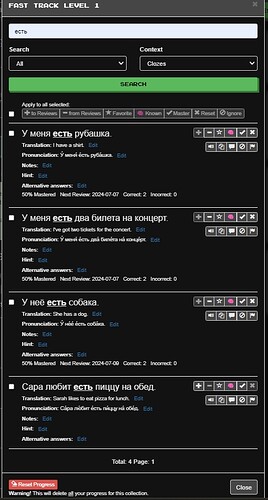In a previous post in this thread - New Fast Track Tracker - #69 by mike
@mike said the following -
The process we went with is to essentially translate the same set of 10,000 English sentences into as many languages as possible. The issue, however, is that although the English set has 10,000 unique cloze words, they don’t always translate into 10,000 unique cloze words. Having super high quality content seemed worth the trade-off.
Now, as you appear to be studying multiple languages from English, you can take a look at for example the New FFT Level 1 list in those languages. By using “Manage Sentences” under the three-dots sign for those collections, you should see that the sets of sentences are the same (perhaps in a slightly different order).
So then, for each sentence there is some word chosen as the cloze, and this appears to be the one that is as close as possible to a specific English word in that sentence that is mapped as that sentence’s unique word for the purpose of getting the 10,000 words and sentences.
This does however mean that a word in the target language can show up as the cloze word multiple times in a collection or collections. For example in Turkish from English in New FFT Level 1, the word “çok” is the cloze word in 5 different sentences (“çok” is a common word in Turkish). I note however, that in each of the English sentences it translates as something different - “very”, “too”, “such”, “a lot”, “lots”.
Also, sometimes a single English word does not translate to a single word in another language, and these cases can also lead to a cloze word being repeated in the target language as a single word needs to be chosen as the cloze (actually that isn’t true as Clozemaster allows contiguous multi-word closes, but that isn’t something that fits with the idea of the FFT).
Examples of these instances in Turkish are repeated use of “zaman” as a cloze as part of “ne zaman” meaning “when”, and “her zaman” meaning “always” N.B. a semi-literal translation of the Turkish words would be “what time” for “ne zaman” and “each/every time” for “her zaman” (i.e. “ne” - “what” ; “her” - “each/every” ; “zaman” - “time”).
Therefore, in Italian the cloze word “attrezzatura” would not have been the word chosen to be the cloze based on frequency. Instead the English word “equipment” would have been the word chosen, and then “attrezzatura” would have been identified as being a good match to use as a cloze in the Italian sentence. As you suggest in your message, there are multiple sources of frequency lists in any language, and so for some English frequency list the word “equipment” could have a much higher ranking than in the one that you gave as an example.
Now whether the choice of “equipment” is based on word frequency or not I don’t know, as the way that @mike described this it could be the case that the sentences have been chosen not on the basis of most common words as much as on common sentences/ideas.
On a personal note, I don’t mind a few repeated clozes or words that are uncommon appearing earlier than they probably should. I find these sentences useful as whole sentences, much more so than just for the clozes contained within them. If a word shows up in a sentence that I don’t know, and don’t remember seeing it as a cloze, then I will search for it as a cloze by using “Manage Sentences” for that collection. If the search result is empty then I’ll copy that sentence to a custom collection and change the cloze word in the sentence to be the one that I’m interested in.
